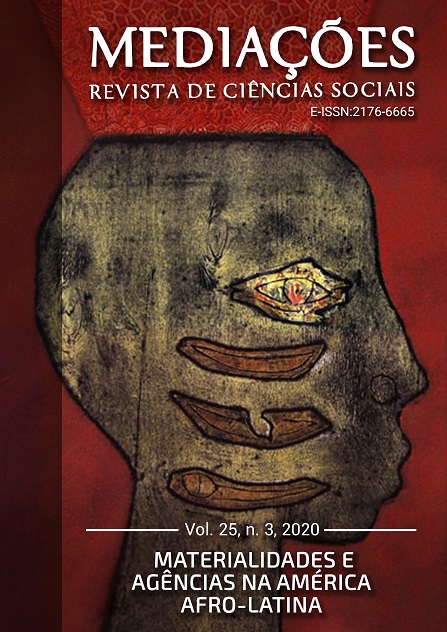Las huellas digitales del comportamiento humano: gustos, neoliberalismo y algoritmos
DOI:
https://doi.org/10.5433/2176-6665.2020v25n3p712Palabras clave:
Neoliberalismo, Gustos, Subjetividades, AlgoritmosResumen
Una de las tareas que se afianzó desde el interior de los trabajos económicos de corte neoliberal fue el estudio de los comportamientos humanos. Esto significó, dentro de múltiples factores y consecuencias, el desarrollo de un sistema de medición y evaluación de estos comportamientos con la intención de generar predicciones y lecturas útiles para el diseño de mecanismos de producción. Al conjugarse con sistemas tecnológicos, que pudieron integrar y efectuar muchos de los planteamientos económicos, las subjetividades se vieron afectadas al ser ya un objeto de constante medición. En esa medida, el objetivo de este artículo es analizar cómo se planteó, dentro de una racionalidad neoliberal, el estudio de los comportamientos humanos, ejemplificado en el gusto. A la par, se busca ilustrar este procedimiento a través del botón "Me gusta" de Facebook y, a partir de allí, plantear algunas líneas de interpretación sobre cómo esta medición, con sus propios métodos y herramientas, afecta las subjetividades contemporáneas.Descargas
Citas
BARRAGÁN, Florencia. Créditos personales: por qué los bancos digitales usan lo que publicás en redes para saber cuánto te pueden prestar. iProUp, Buenos Aires, 9 sept. 2019. Disponible en: https://www.iproup.com/finanzas/7020-fintech-cuenta-machine-learning-Por-que-bancos-digitales-usan-redes-sociales-para-dar-creditos. Acceso en: 3 nov. 2020.
BECKER, Gary. Accounting for taste. Cambridge: Harvard University Press, 1996.
ROUVROY, Antoinette; BERNS, Thomas. Gubernamentalidad algorítmica y perspectivas de emancipación. ¿La disparidad como condición de individuación a través de la relación? Adenda Filosófica, v. 1, diciembre, p. 88-116, 2016.
BOWLES, Samuel; GINTIS, Herbert. The revenge of homo economicus: contested exchange and the revival of political economy. Journal of economic perspectives, v. 7, n. 1, p. 83-102, 1993.
BOZAL, Valeriano. El gusto. Madrid: Visor, 1999.
CASTRO-GÓMEZ, Santiago. Historia de la gubernamentalidad: razón de Estado, liberalismo y neoliberalismo en Michel Foucault. Bogotá: Siglo del Hombre Editores, 2010.
CORONADO-PADILLA, Jorge. Escalas de medición. Paradigmas, Bogotá, v. 2, n. 2, p. 104-125, 2007.
FEBRERO, Ramón; SCHWARTZ, Pedro. La esencia de Becker. Madrid: Ariel, 2001.
FOUCAULT, Michel. La arqueología del saber. Buenos Aires: Siglo XXI Editores, 1979.
FOUCAULT, Michel. Nacimiento de la biopolítica: curso en el Collège de France (1978-1979). México: Fondo de Cultura Económica, 2007.
FRIEDMAN, Milton. The methodolgy of positive economics. In: Friedman, Milton. Essay in positive economics. Chicago: University of Chicago Press, 1966. p. 3-43.
GEISINGER, Kurt F. (ed.). APA handbook of testing and assessment in psychology: test theory and assessment in industrial and organizational psychology. Washington: American Psychological Association, 2013. v. 1.
HURTADO, Jimena. The utilitarian fundations of the economic approach to human behavior. Documento Cede, v. 27, abr. 2005. Disponible en: https://economia.uniandes.edu.co/components/com_booklibrary/ebooks/d2005-27.pdf. Acceso en: 3 nov. 2020.
KOSINSKI, Michal; STILLWELL, David; GRAEPEL, Thore. Private traits and attributes are predictable from digital records of human behavior. PNAS, Washington, v. 110, n. 15, p. 5802-5805, 2013. Disponible en: www.pnas.org/cgi/doi/10.1073/pnas.1218772110. Acceso en: 3 nov. 2020.
LEWIN, Shira. Economics and psychology: lessons for our own day from the early twentieth century. Journal of Economic Literature, Nashville, v. 34, n. 3, p. 1293-323, 1996.
MACY, Michael. Beyond rationality in models of choice. Annual Review of Sociology, Palo Alto, v. 21, p. 73-92, 1995.
MORGAN, Clara. Construyendo el programa para la evaluación internacional de estudiantes de la OCDE (PISA). Profesorado: revista de currículum y formación de profesorado, Granada, v. 17, n. 2, p. 31-45, 2013.
PARETO, Vilfredo. Manual de economía política. Buenos Aires: Editorial Atalaya, 1945.
STIGLER, George J.; BECKER, Gary S. De gustibus non est disputandum. The American Economic Review, Nashville, v. 67, n. 2, p. 76-90, 1977.
VATTER, Miguel. Foucault and Hayek: republican law and liberal civil society. En: LEMM, Vanessa; VATTER, Miguel (ed.). The government of life: Foucault, biopolitics, and neoliberalism. New York: Fordham University Press, 2014.
ZAFIROVSKI, Milan. Economic sociology in retrospect and prospect: in search of its identity within economics and sociology. American Journal of Economics and Sociology, New York, 'v. 58, n. 4, p. 584-627, 1999.
ZUBOFF, Shoshana. The age of surveillance capitalism: the fight for a human future at the new frontier of power. PublicAffairs: New York, 2019.
Descargas
Publicado
Cómo citar
Número
Sección
Licencia
Derechos de autor 2020 Juan Camilo Gómez-Barrera

Esta obra está bajo una licencia internacional Creative Commons Atribución 4.0.
Los derechos de autor de los artículos publicados en Mediations son del autor; En caso de republicación parcial o total de la primera publicación, se solicita a los autores que indiquen la publicación original en la revista.
Mediações utiliza la licencia Creative Commons Attribution 4.0 International, que proporciona acceso abierto, permitiendo a cualquier usuario leer, descargar, copiar y difundir su contenido, siempre que esté debidamente referenciado.
Las opiniones emitidas por los autores de los artículos son de su exclusiva responsabilidad.
































